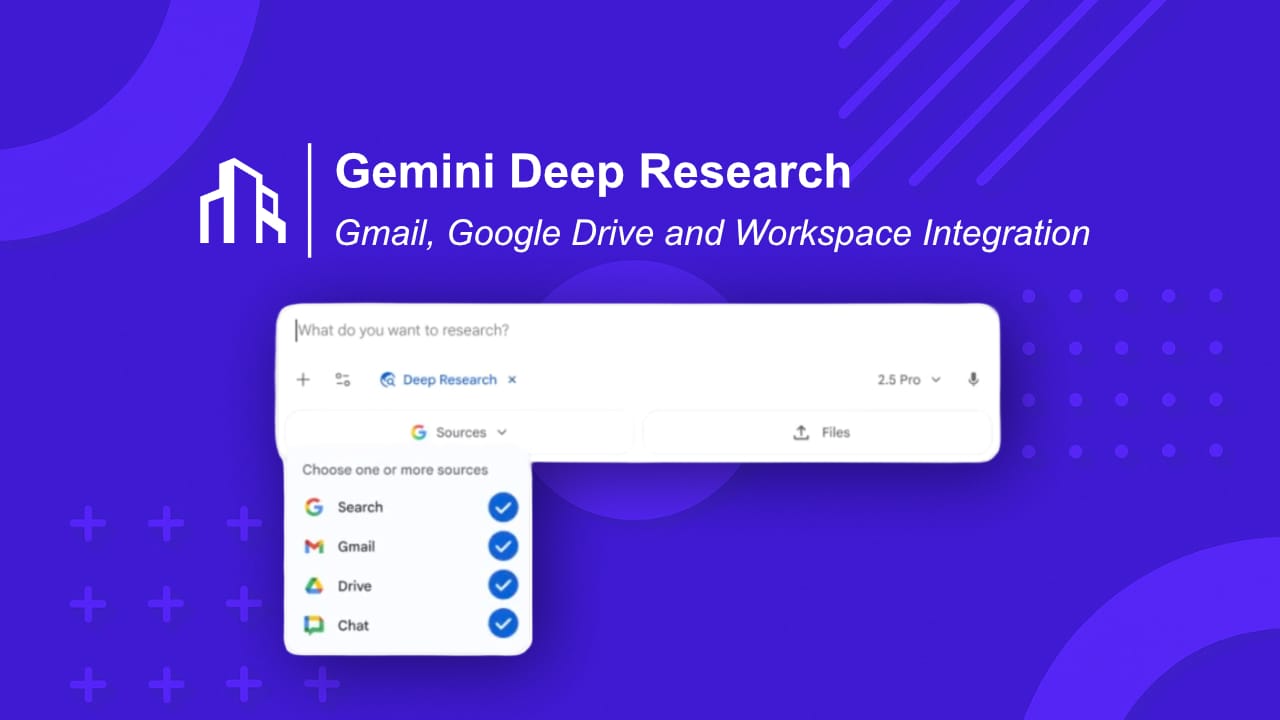Gemini Deep Research: Gmail, Google Drive and Workspace Integration Added
Google has turned Gemini into a full-context AI assistant that can read and reason across Gmail, Drive and Chat. This article explains how the new Deep Research feature works, why it matters and how businesses can turn it into a real workflow advantage.

With the new Deep Research update, Google has turned it into a full-context AI assistant that can read and reason across Gmail, Drive and Chat. That shift changes what Gemini is, what it can do and how companies will use AI inside their daily workflows.
Where ChatGPT and other AI tools still work on isolated prompts, Gemini is moving into what Google calls contextual intelligence. Instead of asking a chatbot for answers, users can now tell Gemini to scan emails, extract insights from documents, analyse drive folders, summarise chat threads, compare sources and produce output based on real internal data.
This turns Gemini into an embedded work assistant rather than a generic text generator.
What Deep Research Really Does
Deep Research is the layer that connects Gemini to Google Workspace. It is built on three pillars:
- Full account-level data access
Gmail, Drive, Docs, Sheets, Slides and Chat can all be queried in one request. - Research tasks instead of prompts
Users no longer type a question. They assign a goal and Gemini gathers, filters and ranks information before answering. - Live retrieval instead of static model memory
Answers are based on current company data, not a frozen model snapshot.
This creates the first mainstream AI assistant that can work across unstructured content, structured files and communication history without manual copy-paste.

Descript
AI-powered audio and video editing platform with transcription, screen recording, and publishing features. Perfect for teams looking to streamline content creation and repurposing.
- ✓ Transcription and AI-powered editing
- ✓ Screen recording and multi-track editing
- ✓ Publishing and collaboration tools
How It Works Inside Gmail, Drive and Chat
Gmail
Gemini can read entire threads, detect intent, extract commitments, draft replies or produce decision summaries. It can also surface older emails that match a request without searching manually.
Drive
Deep Research reads across file types and returns unified answers. A request such as “what did we agree about pricing in the agency proposal?” returns both a paragraph from a PDF and a sentence from a Google Doc.
Chat
Gemini can scan past conversations, track who said what, detect follow-up actions and turn messy discussions into structured output.
Cross-source analysis
The real power is in blended queries:
“Compare the onboarding instructions in the shared Drive folder with the onboarding email sequence in Gmail and highlight inconsistencies.”
That type of task is not possible in ChatGPT or Copilot without manual uploads or API prep.
Why This Is a Bigger Move Than It Looks
Gemini is not trying to beat ChatGPT in raw model quality. It is trying to beat every AI assistant by becoming the default interface to company knowledge.
That matters for three reasons:
- Workflow ownership wins over model quality
The assistant inside your email is used more than the assistant on a separate website. - Real-world tasks need real-world data
A generic LLM cannot answer questions based on internal policies, invoices, proposals or chat logs. Gemini can. - Data gravity is stronger than interface preference
If your files and messages already live in Google Workspace, the lowest-friction AI wins.
Business Use Cases That Immediately Become Possible
| Department | Gemini Deep Research capability |
|---|---|
| Sales | Auto-create a deal brief from past emails, proposals and shared docs |
| HR | Extract employee onboarding steps from chat, docs and forms |
| Finance | Summarise all invoice-related email threads and link the source file in Drive |
| Support | Build response macros from historical chat logs and knowledge docs |
| Leadership | Weekly briefing generated from all team channels and attached reports |
The key shift is no more uploading files into a chatbot. The AI comes to the data, not the other way around.
Compliance and Risk: The Part Google Downplays
Deep Research also brings the biggest AI governance challenge so far:
an assistant with full access to mailboxes, documents and internal history.
The risk areas:
- No native redaction or rule-based scoping yet
- Role-based access still depends on Workspace permissions, not AI-specific policy
- No audit trail of what Gemini looked at during a research task
- No enterprise-grade approval layers for regulated sectors
That means the technology is ahead of the governance model. Companies adopting it will need internal policy before the first query is made.
Where This Puts Gemini vs ChatGPT, Copilot and Perplexity
| Feature | Gemini Deep Research | ChatGPT | Microsoft Copilot | Perplexity |
|---|---|---|---|---|
| Native email access | Yes (Gmail) | No | Yes (Outlook) | No |
| Native Drive access | Yes | No | Yes (OneDrive) | No |
| Chat thread analysis | Yes | No | Limited | No |
| Live retrieval on private data | Yes | Manual upload | Yes | No |
| Multi-source blended answers | Yes | Only with custom plugins | Yes | No |
Gemini is no longer a model war participant. It is a workflow war participant.

Rank Prompt Analytics
Track, test, and improve your AI prompts with precision. Rank Prompt helps you analyze how ChatGPT, Claude, and Perplexity respond — giving you real data on what performs best for engagement, accuracy, and conversions.
- ✓ Measure prompt effectiveness across AI models
- ✓ Compare output quality, tone, and accuracy
- ✓ Optimize prompts for higher visibility and trust
Strategic Impact for Businesses
- AI is no longer a separate tool
It merges into communication and documentation systems. - RFPs, onboarding and reporting can be fully automated
Not through prompts, but through reusable research tasks. - Knowledge management shifts from static wikis to live retrieval
The AI becomes the index, not the documentation. - Vendors without native data access will lose adoption
Stand-alone chatbots will need deep integrations or they die.
What Companies Need Before They Turn This On
- Clear internal policy for AI access to private data
- Role-based access model that matches company org chart
- Logging and monitoring for every AI request touching mail or docs
- A governance layer that separates can access from may access
- A defined rule for how long AI-generated summaries are stored
Without these, adoption becomes a silent security risk.
How Scalevise Fits into This Shift
Teams will not need help using Gemini.
They will need help designing workflows around it.
That includes:
- Turning Deep Research into repeatable business processes
- Applying retrieval governance and audit logging
- Connecting Gemini output to automation platforms like Make or n8n
- Building role-based AI access, not all-or-nothing access
- Eliminating manual knowledge work instead of just summarising it
Scalevise already designs these architectures for Make, CRM systems, onboarding flows and internal automation. Gemini Deep Research becomes another layer in the same stack.
If you want to explore how Gemini Deep Research can be embedded into your workflows instead of used as a simple chatbot, book a session through the scheduler below.
